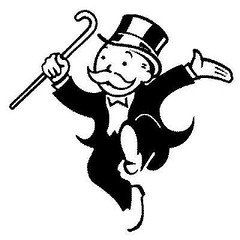Crossposted from The Stars Hollow Gazette
 It’s a fundamental fact of economics that corporations and wealthy individuals do not aspire to free market competition which reduces their margins of profit and forces them to work hard to reduce the “uncertainty” that some upstart will out innovate them. Instead they prefer the predictability of commercial monopolies enforced by the coercive power of a state monopoly of violence. This is in fact one of the main themes of Adam Smith’s The Wealth of Nations.
It’s a fundamental fact of economics that corporations and wealthy individuals do not aspire to free market competition which reduces their margins of profit and forces them to work hard to reduce the “uncertainty” that some upstart will out innovate them. Instead they prefer the predictability of commercial monopolies enforced by the coercive power of a state monopoly of violence. This is in fact one of the main themes of Adam Smith’s The Wealth of Nations.
As Lord Cutler Beckett put it- “It’s just good business.”
Thus it comes as no surprise to me, and I’m sure to Glenn Greenwald either, that in the age of the Internet, when ownership of a Press is practically free (ok, $15 a month but consider how much you spend on coffee, cable, or cell phone), establishment “journalists” celebrate a culture of secrecy accessible only though their personal contacts and Rolodexes.
It’s not as if they’re particularly bright, or prescient, or even good writers. What else do they have to sell?
In economics this is called ‘raising barriers to competition’, on the Internet we call it ‘gatekeeping’.
So Cohen, as a journalist, must be furious about this systematic lack of accountability, transparency and democracy. After all, journalists – as they tirelessly tell everyone – are steadfastly devoted to those values; transparency for political officials is their North Star. Surely, nobody who would devote themselves to this profession would celebrate a President who drenches his entire foreign policy in secrecy – beyond any mechanism for democratic accountability – and who fights numerous covert wars without even any clear legal basis for doing so?
…
(I)t’s simply a given that war with all of these Muslim countries, including Iran, is necessary and inevitable – despite the fact that none is attacking the U.S. or threatening to do so. Warring against all these countries is America’s imperial responsibility and exceptionalist right. The only question, then, is whether the wars will be fought (a) democratically, legally and out in the open, or (b) in secret, with no legal basis or democratic accountability. Cohen, the journalist, chooses (b).As usual, American journalists are the leading proponents not of transparency but of secrecy, not of accountability but of covert decision-making in the dark, not of the rule of law but the rule of political leaders. As Cohen’s Washington Post namesake put it: “it is often best to keep the lights off.” That, with some exceptions, is the motto not only of The Washington Post but of American establishment journalism generally. That’s what NYU Journalism Professor Jay Rosen meant when he said that the reason we got WikiLeaks is because “the watchdog press died.” With some exceptions – some of this we have learned about from whistleblowers leaking to reporters, who then publish it – the American media does not merely fail to fulfill its ostensible function of bringing transparency to government; far beyond that, it takes the lead in justifying and protecting extreme government secrecy. Watching a New York Times columnist stand up and cheer for multiple covert, legally dubious wars and an underground foreign policy highlights that as well as anything one can recall.
…
It is indeed so very baffling. This is one of those bizarre mysteries of life: I find that the more you ponder it – as I’ve been so diligently doing ever since it was raised so powerfully by Jon Chait – the more inscrutable it actually becomes. Why in the world would any liberals possibly not find President Obama as dreamy as those long-time leading lights of liberalism, Jon Chait and Andrew Sullivan, do? There is no rational reason whatsoever for this disenchantment, this refusal to reverently stand and cheer for this great President. Why some liberals insist on complaining is such a deep and impenetrable puzzle that it makes one’s head hurt trying to understand it.

1 comments
Author